The Synology DiskStation DS720+ is the latest in Synology’s line of small desktop NAS. The DS720+ looks like the typical two-bay guy from Synology but there are a few new twists, like two more NVMe M.2 bays on the bottom, bringing the total to four. This particular NAS is designed to streamline user data storage and multimedia management.
The Synology DiskStation DS720+ is the latest in Synology’s line of small desktop NAS. The DS720+ looks like the typical two-bay guy from Synology but there are a few new twists, like two more NVMe M.2 bays on the bottom, bringing the total to four. This particular NAS is designed to streamline user data storage and multimedia management.
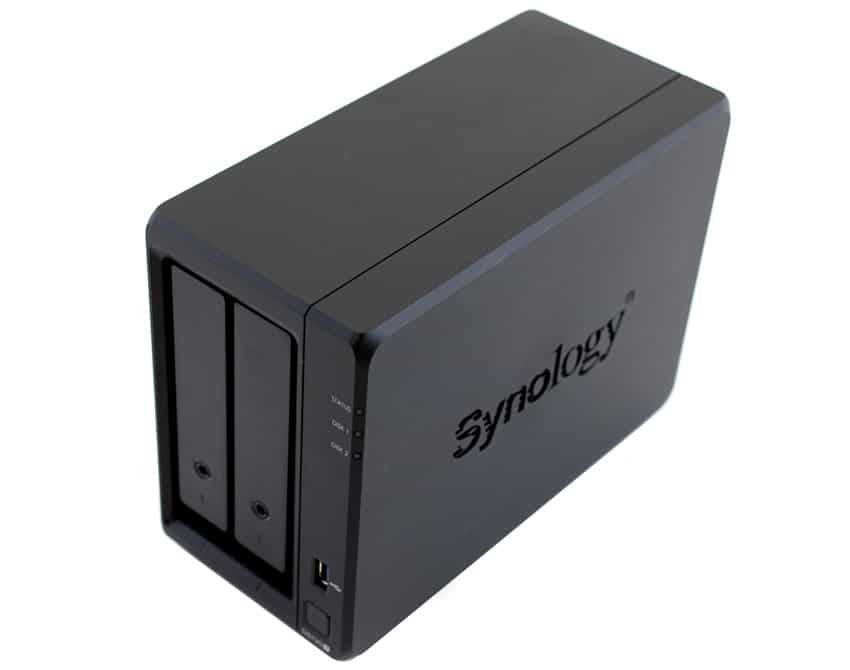
From a hardware standpoint, the DS720+ is more performance-oriented than some of the other Synology NAS devices, as designated by the “+” moniker. The DS720+ is equipped with an Intel Celeron J4125 4-core CPU and 2GB of DDR4 RAM, though one can expand it up to 6GB. As stated, there are two M.2 SSD slots on the bottom that can be used for caching, speeding up performance. If capacity becomes an issue, users can add a Synology DX517 to expand to meet their growing storage needs.
As with all Synology NAS, the Synology DiskStation DS720+ leverages Synology DiskStation Manager (DSM). With this OS the NAS can be turned into several different useful tools or a combination of many.
The Synology DS720+ is available diskless for $399.
Video hardware overview and discussion of key benchmarks:
Synology DiskStation DS720+ Specifications
| CPU | Intel Celeron J4125 4-core 2.0 GHz, burst up to 2.7 GHz |
| Hardware encryption engine | Yes (AES-NI) |
| Memory | 2GB DDR4 onboard (expandable up to 6GB) |
| Compatible drive type | 2 x 3.5″ or 2.5″ SATA HDD/SSD (drives not included) 2 x M.2 2280 NVMe SSD (drives not included) |
| Hot-swappable drive | Yes |
| External port | 2 x USB 3.0 port 1 x eSATA port |
| Size (HxWxD) | 166 x 106 x 223 mm |
| Weight | 1.51 kg |
| LAN | 2 x Gigabit (RJ-45) |
| Wake on LAN/WAN | Yes |
| Scheduled power on/off | Yes |
| System fan | 92 x 92 x 25 mm |
| AC input power voltage | 100 V to 240 V AC |
| Power frequency | 50/60Hz, single phase |
| Operating temperature | 0°C to 40°C (32°F to 104°F) |
| Storage temperature | -20°C to 60°C (-5°F to 140°F) |
| Relative humidity | 5% to 95% RH |
| Maximum operating altitude | 5,000 m (16,400 ft) |
| Networking protocol | SMB, AFP, NFS, FTP, WebDAV, CalDAV, iSCSI, Telnet, SSH, SNMP, VPN (PPTP, OpenVPN, L2TP) |
| File system | Internal: Btrfs, ext4 External: Btrfs, ext4, ext3, FAT, NTFS, HFS+, exFAT6 |
| Supported RAID type | Synology Hybrid RAID (SHR), Basic, JBOD, RAID 0, RAID 1 |
| Storage management | Maximum single volume size: 108TB Maximum system snapshots: 65,536 Maximum internal volume: 64 |
| SSD cache | Read/write cache support M.2 NVMe SSD support |
| File sharing capability | Maximum local user account: 2,048 Maximum local group: 256 Maximum shared folder: 512 Maximum concurrent SMB/NFS/AFP/FTP connection: 500 |
| Warranty | 3 years |
Design and Build
The Synology DiskStation DS720+ is a smallish desktop NAS that is the size of the company’s normal two-bay NAS devices. The two 3.5” drive bays take up a majority of the front of the device. On the right are the indicator lights, USB 3.0 port, and power button. The sides of the NAS have Synology branding that doubles as ventilation.
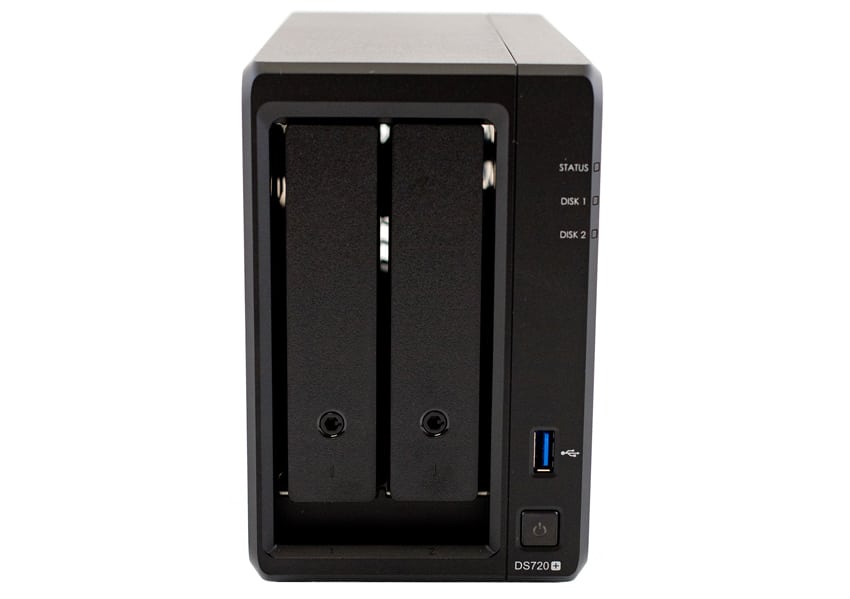
Flipping the device around to the rear the system fan takes up about the top two-thirds of the NAS. Beneath that are two 1GbE RJ-45 ports, a reset button, an eSATA port, the power port, another USB 3.0 port, and the Kensington Security slot.
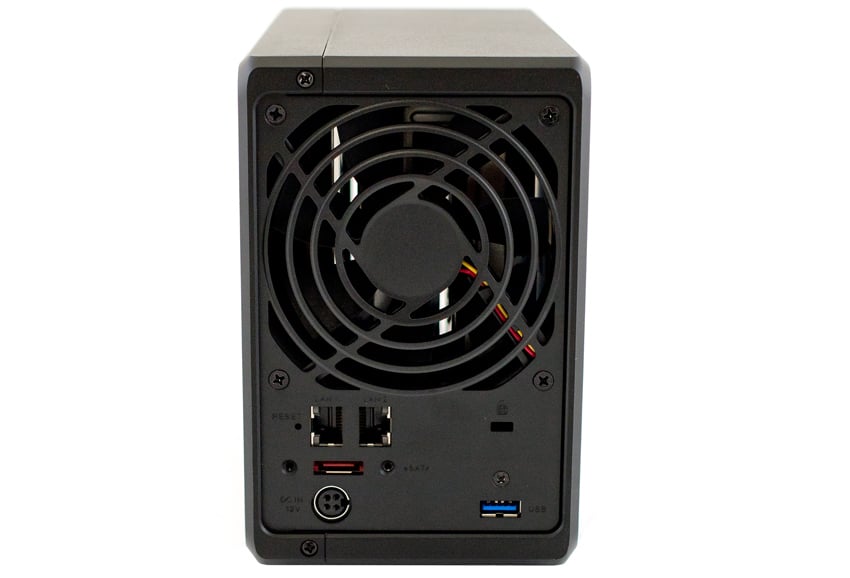
The bottom of the NAS has two slots for M.2 NVMe SSDs. These are toolless and simply pop open so the drives can be inserted.
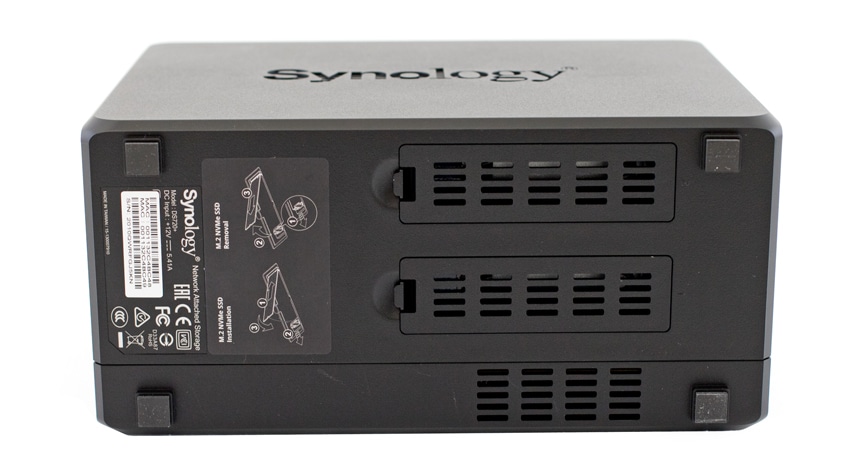
Synology DiskStation DS720+ Performance
Review Configuration
For our testing, we configured the Synology DiskStation DS720+in RAID1 using two 8TB Toshiba N300 NAS HDDs and two Intel 800P Optane 118GB M.2 NVMe SSDs for read/write cache. Each disk configuration used EXT4 volumes and measured iSCSI and CIFS performance across two 1GbE LAN connections. For iSCSI we leveraged two 25GB LUNs and for CIFS two 25GB files were placed for load generation.
Enterprise Synthetic Workload Analysis
Our enterprise shared storage and hard drive benchmark process preconditions each drive into steady-state with the same workload the device will be tested with under a heavy load of 16 threads with an outstanding queue of 16 per thread, and then tested in set intervals in multiple thread/queue depth profiles to show performance under light and heavy usage. Since NAS solutions reach their rated performance level very quickly, we only graph out the main sections of each test.
Preconditioning and Primary Steady-State Tests:
- Throughput (Read+Write IOPS Aggregate)
- Average Latency (Read+Write Latency Averaged Together)
- Max Latency (Peak Read or Write Latency)
- Latency Standard Deviation (Read+Write Standard Deviation Averaged Together)
Our Enterprise Synthetic Workload Analysis includes four profiles based on real-world tasks. These profiles have been developed to make it easier to compare to our past benchmarks as well as widely-published values such as max 4k read and write speed and 8k 70/30, which is commonly used for enterprise drives.
- 4K
-
- 100% Read or 100% Write
- 100% 4K
- 8K 70/30
-
- 70% Read, 30% Write
- 100% 8K
- 8K (Sequential)
- 100% Read or 100% Write
- 100% 8K
- 128K (Sequential)
- 100% Read or 100% Write
- 100% 128K
First up are our enterprise workloads, where we measured a long sample of random 4K performance with 100% write and 100% read activity. Looking at IOPS, the DS720+ showed a performance of 344 IOPS read and 743 IOPS write in CIFS and 777 IOPS read and 569 IOPS write in iSCSI. With cache, numbers showed a significant improvement (as was certainly expected), showing 31,468 IOPS read and 45,392 IOPS write in CIFS, while iSCSI hit 54,225 IOPS read and 49,404 IOPS write.
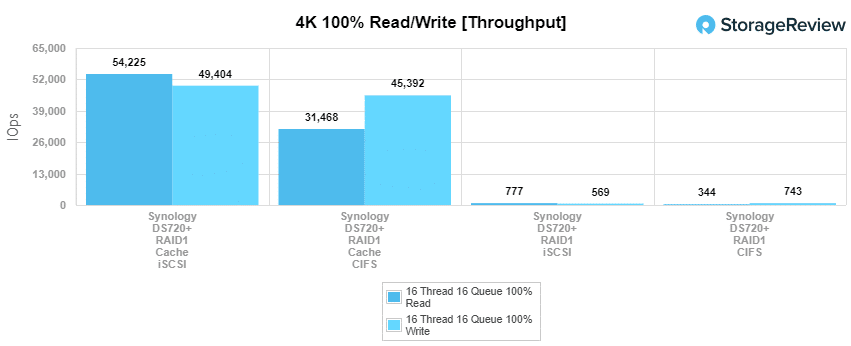
Moving on to 4K average latency, the new Synology NAS hit 743.4ms and 449.6ms for reads and writes in CIFS, while iSCSI reached 329.2ms and 344.4ms for reads and write in the HDD configuration. With cache, the latency fell to 8.13ms read and 5.64ms write in CIFS and 4.72ms read and 5.18ms write in iSCSI.
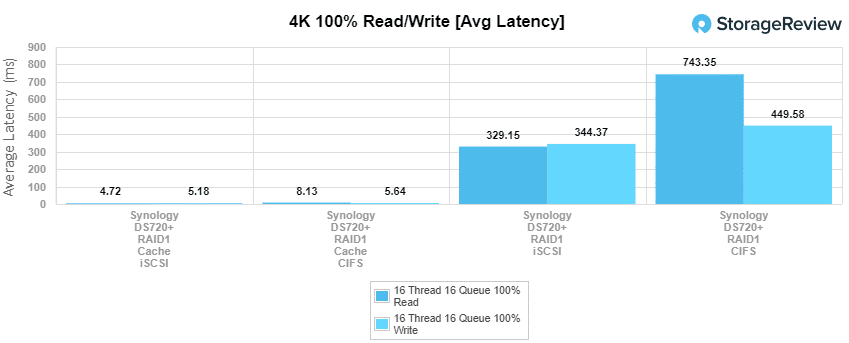
In 4K max latency, the DS720+ recorded HDD performance of 1,348.5ms write and 2,172ms read in CIFS and 6,234.6ms write and 1,836.2ms read in iSCSI. When using cache, we saw it drop to 143.8ms write and 147.26ms read in CIFS and 159.3ms write and 1,123.2ms read in iSCSI.
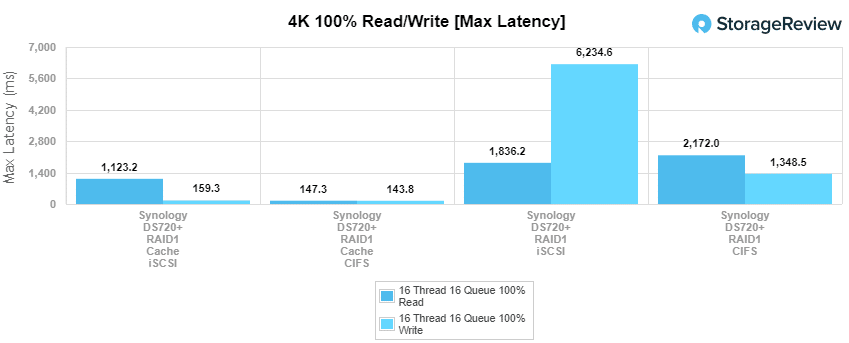
For our last 4K test we looked at standard deviation. Here, we saw the DS720+ post 294.86ms write and 207.66ms read in CIFS and 219ms read and 714.3ms write in iSCSI. With cache, the Synology NAS showed 5.6ms read and 6.2ms write in CIFS and 5.7ms read and 4.2ms write in iSCSI.
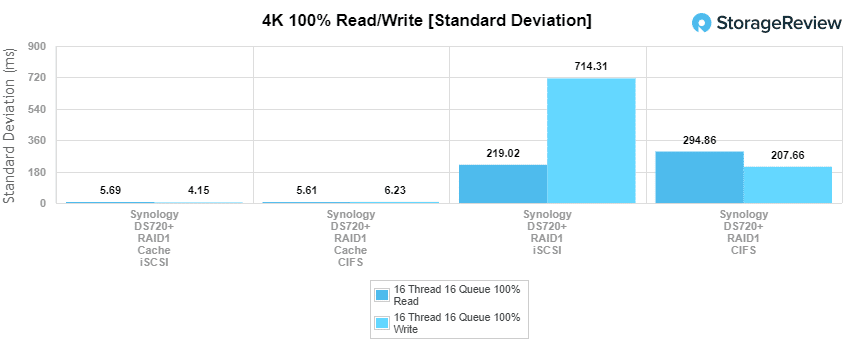
Our next benchmark measures 100% 8K sequential throughput with a 16T16Q load in 100% read and 100% write operations which showed near identical performance across the board. Here, the DS720+ was able to hit 28,002 IOPS write and 28,163 IOPS read in CIFS and 28,403 IOPS write and 28,476 IOPS read in iSCSI. Enabling cache told a similar story with CIFS showing 28,416 IOPS write and 28,174 IOPS read, while iSCSI recorded 28,538 IOPS and 28,474 IOPS in writes and reads, respectively.
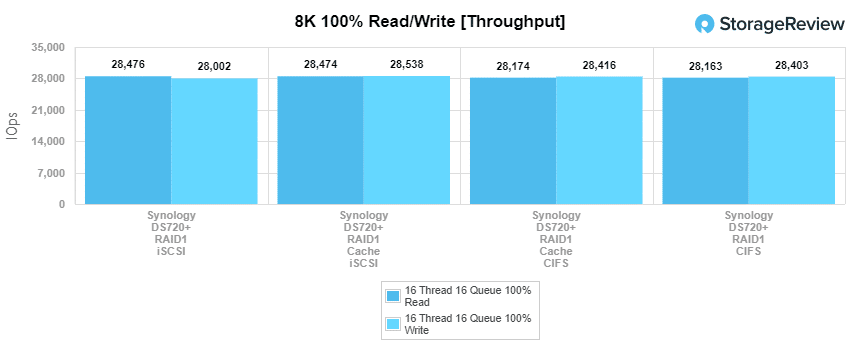
Compared to the fixed 16 thread, 16 queue max workload we performed in the 100% 4K write test, our mixed workload profiles scale the performance across a wide range of thread/queue combinations. In these tests, we span workload intensity from 2 thread/2 queue up to 16 thread/16 queue. First up is throughput, where the HDD configuration posted a range of 338 IOPS to 624 IOPS (iSCSI) and 318 IOPS to 353 IOPS (CIFS), while the cache showed 11,679 IOPS to 24,634 IOPS (iSCSI) and 9,845 IOPS to 17,824 IOPS (CIFS).
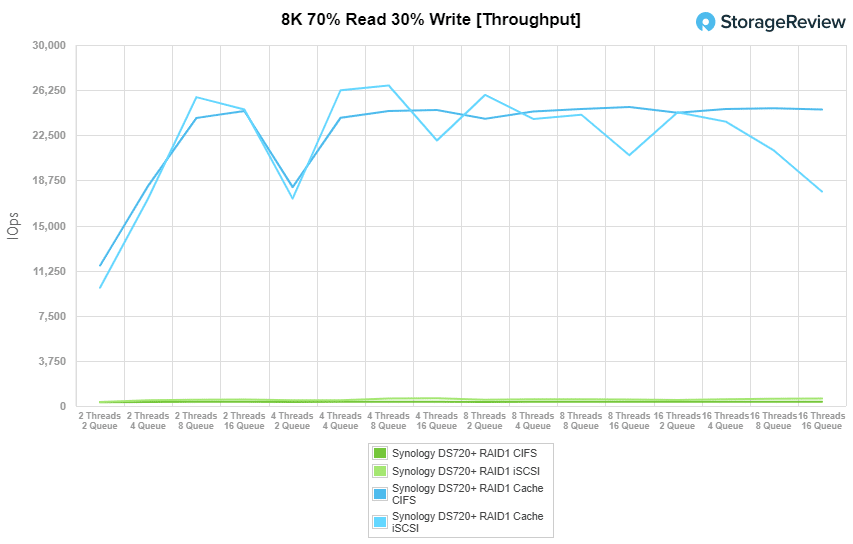
Looking at average latency performance figures in our SSD configuration, iSCSI had yet again the best performance. In our HDD configuration, CIFS showed 12.55ms at burst and finished at 722.94ms, while iSCSI recorded 11.79ms at burst and finished up at 409.82ms. For cache, CIFS ranged from 0.34ms to 10.38ms while iSCSI showed 0.4ms to 14.35ms.
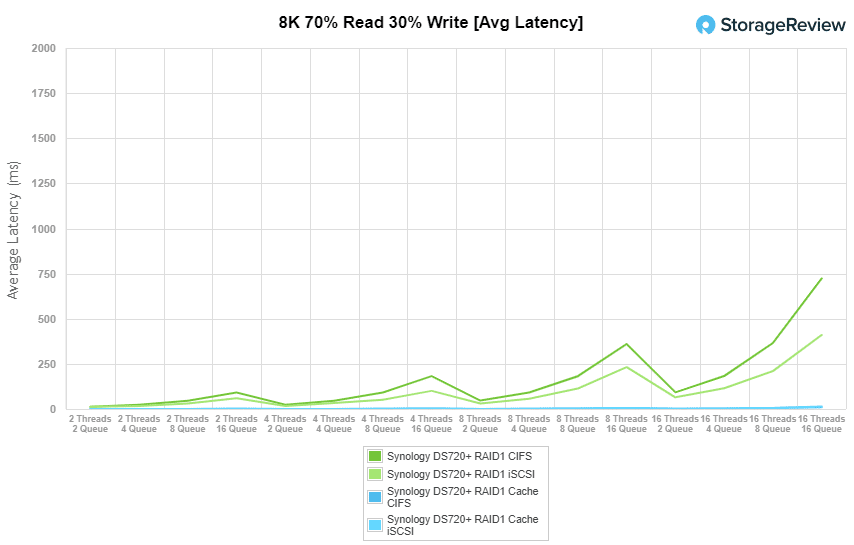
For maximum latency in our HDD configuration, we saw 1,149.3ms to 4,995.13ms in CIFS and 2773.34ms to 4,317.8ms in iSCSI, while cache mode posted 86.51ms to 403.32ms and 155.28ms to 9,160.56ms in CIFS and iSCSI, respectively.
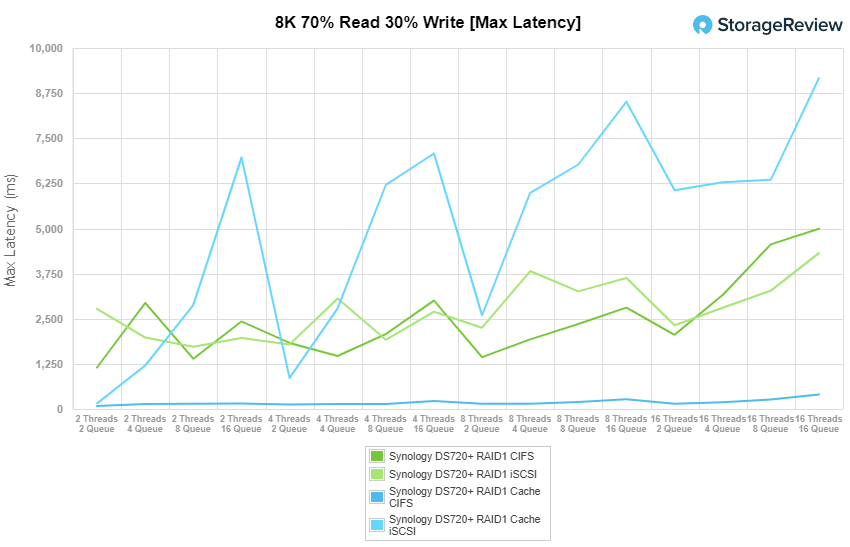
Looking at standard deviation, the DS720+ posted 25.27ms to 561.84ms in CIFS and 50.01ms to 541.56ms in iSCSI with our HDD configuration, while showing ranges of 0.55ms to 17.2ms (CIFS) and 0.6ms to 158.91ms (iSCSI) with cache enabled.
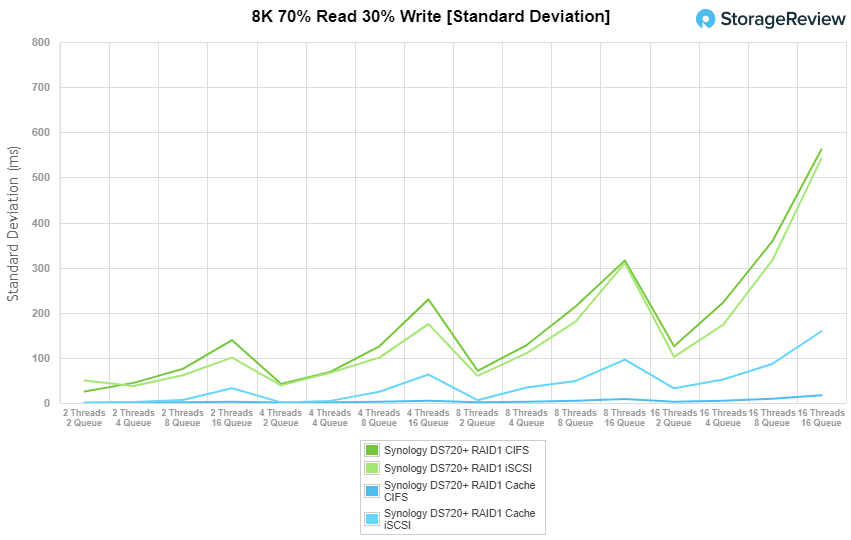
The last synthetic benchmark is our 128K test, which is a large-block sequential test that shows the highest sequential transfer speed for a device. In this workload scenario, the DS720+ had 231MB/s write and 231MB/s read in CIFS and 230MB/s write and 231MB/s read in iSCSI. With cache, we saw the identical performance with CIFS, posting 231MB/s and 232MB/s for writes and reads, respectively, and iSCSI with 230MB/s write and 231MB/s read.
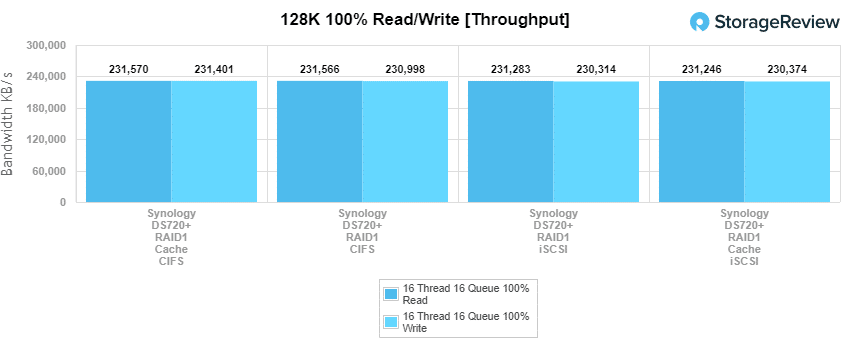
Conclusion
The DS720+ is yet another powerful 2-bay NAS offering from Synology. What sets it apart, however, is the addition of dual M.2 SSD caching bays, which is something you usually only see in larger “plus” units. This certainly adds a ton of performance flexibility as you can see from the results above. Complementing this is an Intel Celeron J4124 4-core CPU, up to 6GB of DDR4 RAM, and support for Synology’s DX517 expansion bays for those who might need more storage capacity as their needs grow. It also comes equipped with two 1GbE ports and is managed by the always-impressive and comprehensive DiskStation Manager, the latter which offers a range of powerful multimedia and management apps.
For performance, we looked at both HDD-only (using dual Toshiba N300 8TB NAS drives) and SSD caching (dual Intel 800P Optane M.2 NVMe 118GB drives) configurations in both CIFS and iSCSI. In our 100% read/write random 4K performance test, we saw 344 IOPS read and 743 IOPS write in CIFS and 777 IOPS read and 569 IOPS write in iSCSI. With cache, the DS720+ was able to hit 31,468 IOPS read and 45,392 IOPS write in CIFS, while iSCSI hit 54,225 IOPS read and 49,404 IOPS write. During our 8K sequential throughput tests, we recorded 28,002 IOPS write and 28,163 IOPS read in CIFS and 28,403 IOPS write and 28,476 IOPS read in iSCSI. Turning cache on, we saw CIFS with 28,416 IOPS write and 28,174 IOPS read, while iSCSI recorded 28,538 IOPS and 28,474 IOPS in writes and reads, respectively.
Lastly, in our large-block sequential test, the DS720+ had 231MB/s write and 231MB/s read in CIFS and 230MB/s write and 231MB/s read in iSCSI. Performance with cache enabled showed identical results, with CIFS posting 231MB/s write and 232MB/s read, and iSCSI with 230MB/s write and 231MB/s read.
The Synology DS720+ brings more power to those that need a small powerful NAS to start, but desire a lower initial investment with 5-bays of expansion capability if needed. The addition of the NVMe bays is another huge plus, as can be seen in our numbers. A tiny bit of flash is a game-changer when it comes to performance, even over GbE. The only downside is these flash bays cannot be configured for RAID, but for caching they do really well. Overall the DS720+ is another strong offering from Synology, sitting confidently atop their 2-bay NAS portfolio.
Engage with StorageReview
Newsletter | YouTube | Podcast iTunes/Spotify | Instagram | Twitter | Facebook | RSS Feed
